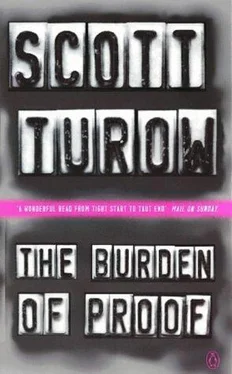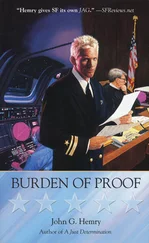Scott Turow - The Burden of Proof
Здесь есть возможность читать онлайн «Scott Turow - The Burden of Proof» весь текст электронной книги совершенно бесплатно (целиком полную версию без сокращений). В некоторых случаях можно слушать аудио, скачать через торрент в формате fb2 и присутствует краткое содержание. Жанр: Детектив, на английском языке. Описание произведения, (предисловие) а так же отзывы посетителей доступны на портале библиотеки ЛибКат.
- Название:The Burden of Proof
- Автор:
- Жанр:
- Год:неизвестен
- ISBN:нет данных
- Рейтинг книги:3 / 5. Голосов: 1
-
Избранное:Добавить в избранное
- Отзывы:
-
Ваша оценка:
- 60
- 1
- 2
- 3
- 4
- 5
The Burden of Proof: краткое содержание, описание и аннотация
Предлагаем к чтению аннотацию, описание, краткое содержание или предисловие (зависит от того, что написал сам автор книги «The Burden of Proof»). Если вы не нашли необходимую информацию о книге — напишите в комментариях, мы постараемся отыскать её.
The Burden of Proof — читать онлайн бесплатно полную книгу (весь текст) целиком
Ниже представлен текст книги, разбитый по страницам. Система сохранения места последней прочитанной страницы, позволяет с удобством читать онлайн бесплатно книгу «The Burden of Proof», без необходимости каждый раз заново искать на чём Вы остановились. Поставьте закладку, и сможете в любой момент перейти на страницу, на которой закончили чтение.
Интервал:
Закладка:
"You must do the same, then. Please call me Sandy."
"Thank you."
"Certainly."
She smiled at him so suddenly, with a flash of such remarkable open amusement at their maneuvering, that Stern himself was taken aback.
"You are inclined to tell me nothing?"
"I can't, Sandy."
"Is there an informant? Is that the reason for your hesitation?"
"No comment."
"Because I have already assumed as much."
"If there's an informant, Sandy, I haven't the foggiest idea who it is."
This, Stern knew, was a Clever response. The Assistants were often in the dark about the identity of informants, particularly those who had been promised they would never have to testify. The secret remained with the FBI agents, who would conduct covert meetings with their source and write reports to the U.S. Attorneys identifying the "c/i"-cooperating individual-only by a number assigned at Bureau headquarters in D.C.
"Mr. Hartnell is not a retiring sort," said Stern. "The business landscape is no doubt replete with those he-has offended. Persons fired. Jealous competitors. You are aware, I am sure, that the comments of such persons have to be evaluated carefully."
Ms. Klonsky laid her pretty face daintily upon her fingertips and smiled agreeably. She was taking it all in, watching him work.
"He's had his troubles before," she said. "The CFTC. One of the exchanges, or was it two?" She took a beat. "Not to mention the IRS."
Oh yes, thought Stern, she had developed a thick file. To be expected.
"I represented Dixon on all of those occasions. There are times that he has put business expansion before recordkeeping. Candidly, Ms. Klonsky, the Exchanges and the IRS enforce a punctiliousness that the U.S.
Attorney's Office itself would have difficulty adhering to." Stern gestured out the door. At times, in this office, you could learn the gravest grand jury secret simply by moving at deliberate speed in the corridors. The young Assistants stood in their doorways, gossiping about investigations. Names were tossed about. Old files were stacked like refuse, without regard to the confidences they contained. Some years ago Stern had seen two large accordion folders with the name of Mayor Bolcarro on them, waiting for storage, and felt a painful twinge of regret for the government's apparent lack of success. His observation made Ms. Klonsky laugh.
"You are wonderful. Stan Sennett said you'd walk through the door and just charm the pants off me, and here you are doing it."
"Me?" He maintained a look of humble innocence, but he registered the mention of Sennett's name with some concern.
Stern.and the present United States Attorney were not mutual admirers.
The relationship went back at least a dozen years, to the period when Sennett was a state court prosecutor and could not seem to win a jury trial when Stern was defending. If anything, the wound had deepened of late. In one of his rare courtroom appearances, Sennett, in January, had prosecuted a case in which Stern represented a local city councilman charged with extorting sexual favors and cash payments from members of his staff. Stern had viiifled the government's chief witness, whom he characterized as a professional informant, a so-called private investigator who seemed to find someone prominent to tattle on whenever his own questionable activities brought him to grief. The councilman was convicted only of one count-a tax misdemeanor-and remained in office, while Sennett lamely claimed victory, a boast openly scoffed at in the press.
In passing, they were cordial-Stern was with every-one-but Stan's memory was long and the rancor deep. As meaningful, for present purposes, was Ms. Klonsky's inadvertent admission that the U.S.
Attorney had been consulted about this case. With five hundred indictments every year, and three times the number of grand jury ivestiga-tions, only matters of prime significance reached the front office. All in all, this was a most unwelcome word. Dixon was making the wrong enemies.
Ms. Klonsky asked for the documents she had subpoenaed, and Stern lifted the cases onto the desk one by one. She rose with some awkwardness, apparently no longer able to judge her body's dimensions confidently, and headed to the hallway to retrieve her file. Left by himself, Stern circumspeetly examined the possessions in her narrow office. Working the endless hours of a young trial lawyer, she observed no distinction between home and workplace; the passions of her private life spilled out here. Amid the inevitable diplomas and licenses, a large Kandinsky-like oil hung, and a banner from a world-peace parade was stretched across her bookcases. The books themselves were not merely the usual ponderous legal treatises and casebooks, but also rows of paperbacks. There seemed to be a good deal of Continental fiction and many political works. Stern saw the name of Betty Friedan a number of times; also Carl Jung. The bottom shelf appeared to be the place of honor. On one side was a single photograph of Ms. Klonsky and a broad, curly-headed man, noticeably younger than she. Four books were centered between silver bookends: three slim volumes that had the look of poetry, all by a man named Charles, and a hardcover book called Illness As Metaphor. On the other side, in a Lucite frame, was a snapshot of a gap-toothed boy; taped to it was a bright; sloppy child's drawing of a figure, over awkward lettering: S, O, N, N, Y. Both N's were drawn backwards.
"Your son?" asked Stern, gesturing to the boy's picture when Klonsky returned. She lugged a brown expandable file across her body. As Stern feared, it was of considerable bulk.
"Sam is my husband's son. He lives with his mother. This is our first."
Wonderful, said Stern. A special joy. He remained deeply attuned to his desire to move onto a friendly footing with her.
"Wonderful or crazy," she said. "I refer to this as a geriatric pregnancy. My obstetrician is absolutely paralyzed. A forty-one-year-old lawyer with a medical history! He's afraid his malpractice premiums will double."
Stern smiled amiably, but naturally offered no comment. A medical history, he noted. "Sometimes I think I'm nuts getting started at this age."
"Well, you say your husband is experienced."
"Oh, Charlie? I'm not sure he's noticed that I'm pregnant."
She laughed, but her eyes veered away as she measured some private thought, so that Stern knew they had abruptly reached the end of this road.
Instead, she reached for the documents, sorted and rubberbanded, which Stern had piled on the desk. They had been organized trade by trade, and she checked them off the subpoena. As she worked, Stern again began quietly asking questions. He had closely examined the records, he said.
They disclosed nothing exceptional. No apparent market manipulation, no passing off bad trades to discretionary ppeared to be the place of honor. On one side was a single photograph of Ms. Klonsky and a broad, curly-headed man, noticeably younger than she. Four books were centered between silver bookends: three slim volumes that had the look of poetry, all by a man named Charles, and a hardcover book called Illness As Metaphor. On the other side, in a Lucite frame, was a snapshot of a gap-toothed boy; taped to it was a bright; sloppy child's drawing of a figure, over awkward lettering: S, O, N, N, Y. Both N's were drawn backwards.
"Your son?" asked Stern, gesturing to the boy's picture when Klonsky returned. She lugged a brown expandable file across her body. As Stern feared, it was of considerable bulk.
"Sam is my husband's son. He lives with his mother. This is our first."
Wonderful, said Stern. A special joy. He remained deeply attuned to his desire to move onto a friendly footing with her.
"Wonderful or crazy," she said. "I refer to this as a geriatric pregnancy. My obstetrician is absolutely paralyzed. A forty-one-year-old lawyer with a medical history! He's afraid his malpractice premiums will double."
Читать дальшеИнтервал:
Закладка:
Похожие книги на «The Burden of Proof»
Представляем Вашему вниманию похожие книги на «The Burden of Proof» списком для выбора. Мы отобрали схожую по названию и смыслу литературу в надежде предоставить читателям больше вариантов отыскать новые, интересные, ещё непрочитанные произведения.
Обсуждение, отзывы о книге «The Burden of Proof» и просто собственные мнения читателей. Оставьте ваши комментарии, напишите, что Вы думаете о произведении, его смысле или главных героях. Укажите что конкретно понравилось, а что нет, и почему Вы так считаете.












